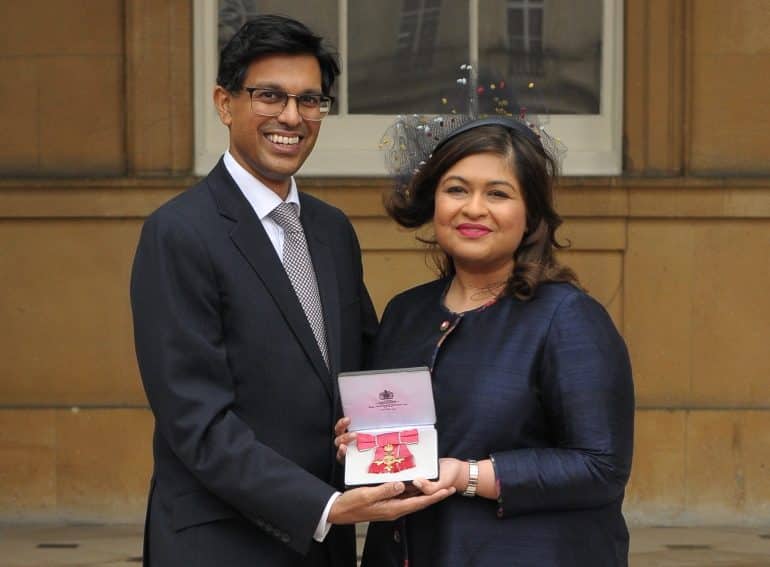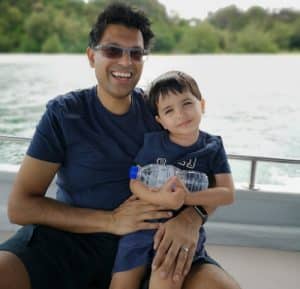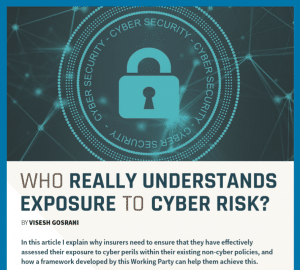An international career built on embracing new challenges

Visesh Gosrani’s career has taken him from the City of London to the tech hubs of Shoreditch, then across the Atlantic to Silicon Valley, before bringing him back full-circle to the City.
 Through all these changes of location, there is one common thread around which he has built his career: insurance. “Whilst most people regard this facet of life as nothing more than an administrative pain, insurance has provided me with a passion where I continuously find a new challenge to keep me on my toes,” he says.
Through all these changes of location, there is one common thread around which he has built his career: insurance. “Whilst most people regard this facet of life as nothing more than an administrative pain, insurance has provided me with a passion where I continuously find a new challenge to keep me on my toes,” he says.
Having started out in mainstream insurance, Visesh (OE 1995-1997), who lives in north London, is now focused on the more rarefied area of cyber risk.
Visesh’s family were moving to London as he started his Sixth Form years, and his previous headmaster recommended he apply to QE. Having been accepted, he set about his School career in Barnet with vigour.
In fact, with rather too much vigour, on occasion. He recalls Mr Davis, Head of Chemistry at the time, being unimpressed with the “high jinks” of him and his classmates in creating some explosive mixtures during lessons – “he seemed to think that was distinctly passé”. They had to redo that section of their coursework over the half-term holiday.
Another initiative Visesh was involved in was the creation of a Sixth Form tuck shop. He and a small band of others were entrusted with taking a disused space and hawking wares that, he says, might be frowned upon in today’s society – “not a piece of fruit to be seen and constantly reordering pickled onion Monster Munch”.
The team raised in excess of £1,000 for School funds in the first term, securing the future for this Sixth Form perk. In fact, term after term they managed to increase their fundraising successes, with Visesh enjoying playing suppliers off against each other, as he drove costs down. He even managed to bring some product promotions to the tuckshop.
After A-levels, Visesh studied Business Mathematics and Statistics at the London School of Economics and then pursued a career as an actuary, starting with PricewaterhouseCoopers in 2000.
While it was his love of Mathematics that pushed him in the general direction of actuarial science, it was the Old Elizabethan network which provided him with his first actual taste of such a career, when he spent a week shadowing an OE who had qualified as a Life Actuary and was working for Canada Life. As Visesh saw the importance of the actuary’s role in meetings – from those focused on marketing to those that examined the company’s financial strength or dealt with a complex fraudulent claim – he quickly came to appreciate the impact that an actuary could have across an entire organisation.
After ten years in consulting, he was offered the opportunity to be part of the turn-around of a mortgage insurer, Genworth Financial, at the height of the 2007–2008 financial crisis.
It was, says Visesh, a huge growth experience for him, as the deeper his team dug into the issues the organisation had, the more he found: he realised ignorance can sometimes be bliss. However, the additional intelligence his team found cleared the way for the organisation to be able to negotiate commercial deals to settle its liabilities.
The firm was continually restructuring during this period and, in what was an unsettling environment for most of the staff, Visesh found fresh opportunity as he was seen as a safe pair of hands to take on responsibilities in areas where restructuring had left no leader. Through this, he realised that he was more inclined to a wider risk-management career, and when there was no further opportunity to grow within Genworth, he took the role of Deputy Chief Risk Officer at a Lloyds of London managing agency, being promoted to Chief Risk Officer a year later.
It was then that he seized the opportunity to set up independently. A chance conversation with an old university friend prompted them to join forces and set up an ‘insurtech’ – industry slang for an entity that uses insurance and technology to solve an insurance problem. The insurtech attempted to find a solution to an issue with which insurers had been wrestling – the difficulty in finding good insurance risks for home insurance.
“In a nutshell, we developed a method to identify people’s true potential for risk. In plain English, what this meant was that the method could differentiate between two similar people, one of whom might just pull the door shut behind them when they leave the house, while the other would deadlock the door and double-check it.”
Early on, this development interested a Silicon Valley entrepreneur to whom Visesh was introduced by a friend. He mentored Visesh and his fellow co-founder and then offered them the opportunity to apply their method to the growing corporate cyber risk insurance market.
This turn in Visesh’s career also led to one of his career highlights. The Organisation for Economic Co-operation and Development were recognising the huge potential impact of cyber risk, and Visesh was asked to be a speaker on the challenges impeding the development of the cyber insurance market at a specially convened OECD conference in 2018. The event gave him greater insight into the governmental mindset around this risk.
 Another highlight has been his election as Chair of the Institute and Faculty of Actuaries Cyber Risk Working Party – “a research effort focused on understanding the impact of cyber risk on insurance and on the other industries actuaries are involved in.”
Another highlight has been his election as Chair of the Institute and Faculty of Actuaries Cyber Risk Working Party – “a research effort focused on understanding the impact of cyber risk on insurance and on the other industries actuaries are involved in.”
Recently, he says, “it has become clearer that the culture and competence elements that are so important to cyber risk are also important to other facets of insurance and that it is possible to utilise these. I have refocused my specialist area to be more about culture, competence and its impact on insurance.” A three-year-old cyber risk-modelling start-up firm has just appointed him to its advisory board.
When Visesh reflects on his career to date, he credits QE with laying two significant foundations: “Firstly, you are the average of those people you spend your time with. Needless to say, the calibre of the boys at QE is exceptional and that naturally spurred many to a higher level than they might otherwise have aimed for. Secondly, there is the wealth of opportunities – QE offered an incredibly varied range of ways in which to participate in School life. This participation was not limited to the few, either: almost everyone took part in some form.”
“When thinking of the advice I would give my younger self or any other QE boy setting out on his career, it is to find a subject and a vocation that you are passionate about. When you enjoy your area, it comes through in your willingness to work hard at it and speak about it to others. Given you spend more of your waking life on your career than anything else, it is important that you love what you do and, even if it feels like a U-turn or change might mean you’ve wasted some of your history, it is better than setting sail for a lifetime of drudgery!”
The OE whom he shadowed at Canada Life is not the only way in which the QE experience has had an impact on the rest of his life: he met, Nishma, the girl who would later become his wife, through QE friends.
Visesh and his wife have been listed in the Asian Power 100 List for the last three years. She juggles her demanding consulting career with her drive to ensure equitable treatment for all. This has entailed opening doors for minorities in financial services, the performing arts and other sectors, and also improving transparency through her efforts to realise gender pay gap reporting. Nishma Gosrani was awarded an OBE in the 2020 New Year’s Honours list.
“I also credit my three-year-old son with keeping me grounded with his typical black-and-white views on the actions of his daddy – and for demonstrating how some of the simplest things in life can bring such great pleasure.”
